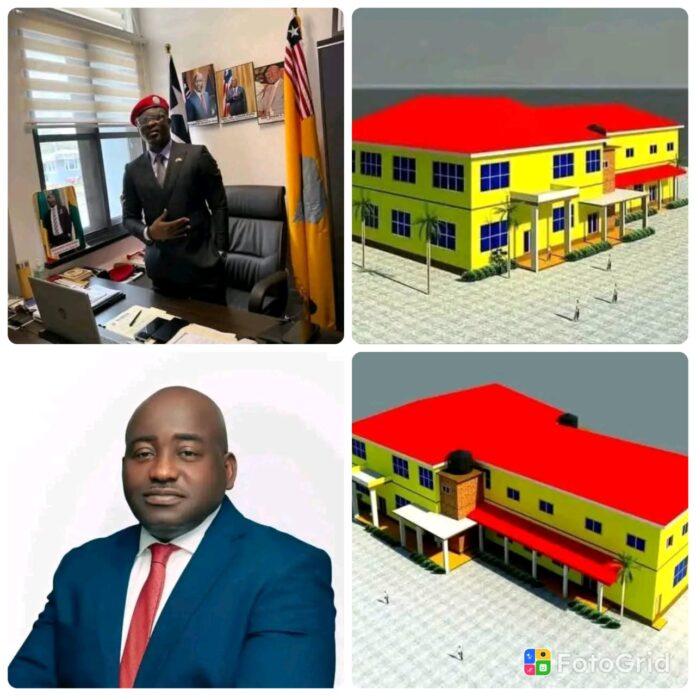—Analytical Look at Infrastructure Investment, Governance Strategy, and Political Collaboration in Gbarpolu County
A new chapter in local governance and infrastructure development is unfolding in Bopolu City, as plans move forward for the construction of a state-of-the-art two-story City Hall complex. Spearheaded by Hon. Zinnah A. Norman in partnership with Hon. Musa Bility, leader of the Citizens Movement for Change (CMC), the initiative is being hailed as both a tangible investment in public infrastructure and a symbolic gesture of political collaboration for community advancement.
While the project has been publicly celebrated, it also offers a lens into evolving strategies of regional development in Liberia—especially amid growing demands for decentralization, transparency, and service delivery at the local government level.
Infrastructure Development as a Governance Tool
The proposed City Hall will serve as the administrative nucleus of Bopolu City, housing local government offices, council chambers, and public service desks. The project not only promises modern amenities but also aims to enhance public access to civic engagement and service delivery.
Analysts see the investment as part of a broader shift in Liberia’s local governance strategy, where physical infrastructure is increasingly seen as a catalyst for institutional strengthening. As cities like Gbarnga and Buchanan have modernized their city halls in recent years—with support from international donors or legislative leadership—Bopolu’s move is interpreted as Gbarpolu’s bid to close the infrastructure gap in historically marginalized counties.
Political Collaboration in Practice
The sponsorship by Hon. Musa Bility, a national political figure and CMC leader, marks a noteworthy political development. Though not elected from Gbarpolu County, Bility’s decision to finance the project reflects a growing trend of cross-regional political outreach and coalition-building outside of traditional electoral strongholds.
Bility’s involvement also underscores the strategic use of infrastructure investment to bolster political credibility, especially amid his party’s national messaging around anti-corruption and institutional reform. CMC’s platform includes a strong emphasis on local empowerment and good governance, making the Bopolu City Hall project a practical demonstration of those ideals.
Community Reception and Social Impact
Initial reactions from residents in Bopolu have been largely positive. Many citizens have expressed public appreciation for the initiative, seeing it as long overdue in a city that lacks centralized facilities for municipal functions.
“Having a modern City Hall means we can hold our leaders accountable in a proper venue. It’s a sign that governance is coming closer to the people,” said Sarah Kollie, a market vendor and community youth leader in Bopolu.
Socially, the City Hall project is expected to generate temporary employment during the construction phase and stimulate local businesses, particularly in construction, catering, and administrative services.
Symbolism vs. Sustainability
Despite public praise, policy experts urge a focus on sustainability and functional design, warning that too many government buildings in Liberia are underused or poorly maintained due to lack of operational funding or trained administrative staff.
“Investing in a City Hall is meaningful, but the long-term question is how the facility will be resourced and managed,” noted Dr. Thomas Wuo, a governance researcher at the University of Liberia. “Will there be trained personnel, digitized systems, or proper budgeting for recurrent costs like electricity, maintenance, and public access?”
Without a clear operations framework, observers warn the building could become a symbolic monument rather than a functional tool for governance reform.
Looking Ahead: A Template for Decentralization?
If completed and properly managed, Bopolu’s new City Hall could serve as a template for decentralized development across Liberia’s 15 counties. The project aligns with broader policy discussions on devolving power and resources to local government structures, as called for in Liberia’s National Decentralization Policy.
More importantly, it raises questions about the role of non-state actors and political leaders in funding development projects—potentially filling gaps left by constrained public budgets but also raising concerns about political patronage and transparency.
Conclusion
The Bopolu City Hall project is more than a construction venture—it is a case study in how infrastructure, politics, and governance intersect in post-war Liberia. Backed by local leadership and national political will, it presents an opportunity to shift public service delivery closer to communities and build a culture of civic accountability. Whether it becomes a model of reform or a missed opportunity will depend not just on its completion, but on how it functions in practice.



